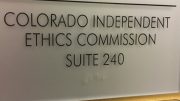By Dinah Zeiger
CFOIC Contributor
State lawmakers introduced three bills in the opening weeks of the 2016 legislative session intended to safeguard Colorado whistleblowers.
The measures would: 1) prohibit municipalities, counties and school districts from disciplining employees who report abuses; 2) shield state employees from disciplinary action for reporting “non-public” information; and 3) protect homeowners from retaliation or discrimination by homeowners’ associations.
Many cities and counties in Colorado have ordinances preventing retaliation against employees for disclosing violations of laws or mismanagement or waste of public funds. School districts and boards are less likely to have done so.
“We have whistleblower protection for state employees, but we don’t have it for all municipal, county and school district employees statewide,” said Rep. Daniel Kagan, D-Cherry Hills Village. “That struck me as an anomaly.”

Rep. Daniel Kagan
His proposal, HB16-1078, extends existing provisions that prohibit retaliation against state employees for reporting such violations.
The bill, set for a hearing Feb. 3 in the House Local Government Committee, lists instances where local government employees would be shielded and clarifies when they would not, including knowingly releasing false or protected confidential information.
The measure also provides two paths to resolution: first through an administrative law judge; second through a civil action in district court. Kagan said the two-fold process allows for a thorough airing of grievances. “We don’t want to slam the door on meritorious cases,” he said. “Hopefully, the administrative law judge will weed out those cases that are without merit. But administrative hearings aren’t set up to give as thorough a hearing as a lawsuit in district court.”
Kagan rates the likelihood of passage as good but acknowledges that municipalities and counties may not be fully on board because of objections over local control issues. “These are not frivolous arguments,” he said.
SB 16-056, sponsored by Sen. Kent Lambert, R-Colorado Springs, addresses whistleblower protection in cases where the mere fact of reporting an abuse could constitute a violation of the law, leading to a range of disciplinary actions, including firing.
The Colorado Open Records Act and other statutes contain a host of exemptions, ranging from test questions on state licensing exams to data generated for construction contracts to ongoing civil or administrative investigations. Under current law, a state employee may be disciplined for revealing such confidential information to a supervisor.
Lambert’s bill, scheduled for a hearing Feb. 3 in the Senate Judiciary Committee, would protect state employees from disciplinary action when reporting instances of waste, mismanagement of public funds or abuses of authority to three designated “whistleblower review agencies.”

Sen. Morgan Carroll
The Office of Legislative Legal Services, the Office of the Attorney General and the Commission on Judicial Discipline would vet the merits of releasing the information publicly.
Sen. Morgan Carroll, D-Aurora, introduced SB 16-082 to address what she characterizes as “the chronic frustration heard from 12 years of town hall meetings.”
The bill would protect homeowners from retaliation or discrimination by a homeowners’ association when they file a complaint or report an alleged violation of HOA bylaws, rules or any other covenant. Often, the retaliation is petty – singling out the homeowner for enforcement of rules or levying fines, Carroll said.
No explicit protection currently exists in key HOA laws to protect homeowners’ rights, she said. Under her proposal, a homeowner may bring a civil action in county or district court against the HOA. Remedies include a court-issued injunction or award of damages, court costs and attorney’s fees, Carroll said.
SB 16-082 is scheduled for a hearing Feb. 10 in the Senate Business, Labor and Technology Committee.
Dinah Zeiger is a former Denver Post reporter and a retired University of Idaho media law professor.
Follow the Colorado Freedom of Information Coalition on Twitter @CoFOIC. Like CFOIC’s Facebook page. Do you appreciate the information and resources provided by CFOIC? Please consider making a tax-deductible donation.




